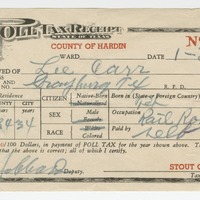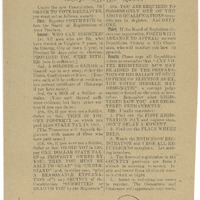Vanguard: Black Women and the Right to Vote
Summary
If you're going to cover the 19th Amendment in 2020, here’s a place to look for, if you will, some version of the rest of the story.—Martha Jones
The 19th Amendment, which granted women the right to vote, was added to the Constitution in 1920. In celebration of the centennial anniversary of the women’s suffrage movement, a statue of white suffragists Elizabeth Cady Stanton and Susan B. Anthony was commissioned to be placed in New York City’s Central Park. Eventually, the monument was revised to also include abolitionist and activist Sojourner Truth. While Sojourner Truth is rightfully upheld as an example of Black women’s fight for the vote, the movement extends far beyond her.
Black women were a part of the women’s suffrage movement from its inception. Organizations like the National Association for Colored Women (NACW)—later the National Association of Colored Women's Clubs (NACWC)—advocated for their rights. During the Civil War, similar women’s organizations formed to provide relief to soldiers and refugees. Over time, these groups became more politicized, and by the 1890s, the NACW was formed expressly to challenge and push back against rising segregation and disenfranchisement.
Unlike white women’s suffrage groups, the NACWC was not a single interest organization. Black women had to work in a multifaceted way to combat the white supremacy present in the mainstream women’s suffrage movement as well as advocate for the rights of Black women. After the 19th Amendment was ratified, Black women were left to essentially build their own movement, as the amendment did not provide them any guarantees of their suffrage rights.
The white supremacy present in the women’s suffrage movement is exemplified by Elizabeth Cady Stanton, who advocated for educated suffrage—suffrage only for the elites—before universal suffrage, whereas Fredrick Douglass argued that the ability for Black Americans to vote was a matter of life and death. Black women were also key parts of these debates. Frances Ellen Watkins Harper, an abolitionist, poet, and suffrage advocate, called attention to the role of Black women in the long struggle for equality.
Even after the 15th Amendment granted Black men the right to vote and the 19th Amendment gave women the vote, many Black women were still functionally barred from voting. Poll taxes were one way that Black people were barred from voting. Often due on tax day rather than election day, these taxes generally prohibited poor and working class people across the country from voting. When paired with Grandfather clauses, which excused people from paying a poll tax if their grandfather voted prior to the 15th Amendment, poll taxes had an even greater prohibitive effect. While the poll tax laws and grandfather clauses contained neutral language, their primary goals were to prohibit first Black men and, later, Black women from being able to vote.
The poll taxes and grandfather clauses held up to Supreme Court inspection, and showed Black Americans that the courts were willing to interpret these discriminatory laws as narrowly as possible to keep them from exercising their right to vote. Similar narrow interpretations continue today with 21st century voter ID laws that disproportionately disenfranchise poor people and people of color.
Suggested Reading
Jones, Martha S. Vanguard: How Black Women Broke Barriers, Won the Vote, and Insisted on Equality for All. Basic Books, 2020.
- Title
- Vanguard: Black Women and the Right to Vote
- Description
- This teaching module discusses how Black women fought against both racism and sexism during their fight for women's suffrage, featuring a webinar with Martha S. Jones, author of the 2020 book, Vanguard: How Black Women Broke Barriers, Won the Vote, and Insisted on Equality for All.
- Contributor
- Professor Martha S. Jones, Johns Hopkins University
- Documents
-
 Webinar - Vanguard: Black Women and the Right to Vote (2024)
Webinar - Vanguard: Black Women and the Right to Vote (2024)
-
 19th Amendment to the United States Constitution (1920)
19th Amendment to the United States Constitution (1920)
-
 The Woman Suffrage Movement and Frederick Douglass (1908)
The Woman Suffrage Movement and Frederick Douglass (1908)
-
 Texas Poll Tax (1901)
Texas Poll Tax (1901)
-
 Poll Tax Receipt for Lee Carr (1955)
Poll Tax Receipt for Lee Carr (1955)
-
 Notice to Republican Voters of the 9th Congressional District of Virginia (1902)
Notice to Republican Voters of the 9th Congressional District of Virginia (1902)
- Temporal Coverage
- Civil War and Reconstruction
- Gilded Age
- Jim Crow Era
- Progressive Era
- Long Civil Rights Movement
- World War I
- Prohibition Era
- Interwar Period
- Spatial Coverage
- United States
- Title
- Vanguard: Black Women and the Right to Vote
- Description
- This teaching module discusses how Black women fought against both racism and sexism during their fight for women's suffrage, featuring a webinar with Martha S. Jones, author of the 2020 book, Vanguard: How Black Women Broke Barriers, Won the Vote, and Insisted on Equality for All.
- Contributor
- Professor Martha S. Jones, Johns Hopkins University
- Documents
-
 Webinar - Vanguard: Black Women and the Right to Vote (2024)
Webinar - Vanguard: Black Women and the Right to Vote (2024)
-
 19th Amendment to the United States Constitution (1920)
19th Amendment to the United States Constitution (1920)
-
 The Woman Suffrage Movement and Frederick Douglass (1908)
The Woman Suffrage Movement and Frederick Douglass (1908)
-
 Texas Poll Tax (1901)
Texas Poll Tax (1901)
-
 Poll Tax Receipt for Lee Carr (1955)
Poll Tax Receipt for Lee Carr (1955)
-
 Notice to Republican Voters of the 9th Congressional District of Virginia (1902)
Notice to Republican Voters of the 9th Congressional District of Virginia (1902)
- Temporal Coverage
- Civil War and Reconstruction
- Gilded Age
- Jim Crow Era
- Progressive Era
- Long Civil Rights Movement
- World War I
- Prohibition Era
- Interwar Period
- Spatial Coverage
- United States